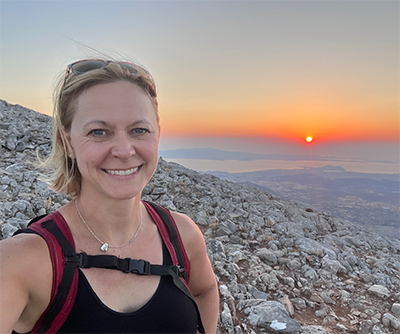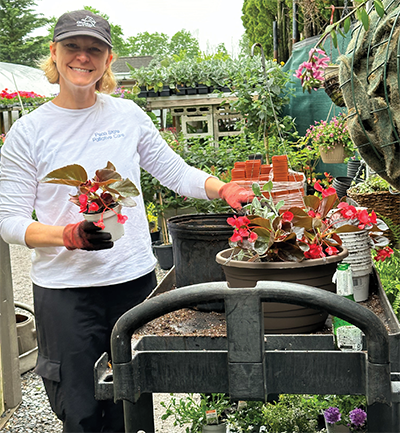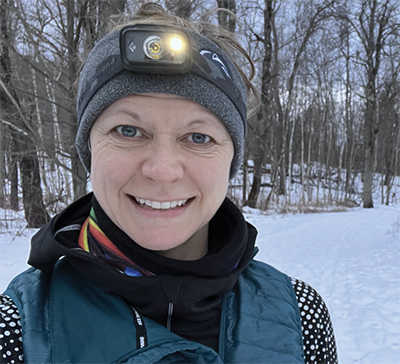
How did you choose to pursue the specialty of hospice and palliative medicine?
During medical training, I found myself gravitating toward people whose suffering was unaddressed. The people I saw providing the care that truly focused on what was right for those patients were the hospice and palliative care (HPC) clinicians. After learning about the burgeoning specialty, I had no doubt that HPC was the perfect path for me to work as part of a team to help people live as well as possible, regardless of their illness or personal situation.
Which aspects of providing hospice and palliative care do you find most rewarding?
The most rewarding part of HPC is working with an interdisciplinary team to help make terrible situations a little less terrible. No matter what challenges we encounter, someone on the team has the ability to help people feel seen and heard and address their needs.
What part of the CMO role excites you the most?
I look forward to meeting members and hearing about the unique work they are doing as well as the challenges they face so I can be a part of relevant, evidence-based, collaborative efforts to improve the way we equitably provide serious illness care in this country.
What can be done to help others—physicians and medical professionals, patients and family, lawmakers, and the media—become more aware of hospice and palliative care?
There are many layers to delivering the message about hospice and palliative care. It starts with personalized care for every patient we meet so their good experience is an example for their family and friends. Next, we should all consider ourselves teachers, whether working in academics or not, since we have daily opportunities to share stories with our colleagues, community leaders, and political representatives about the way hospice and palliative care can help people live well. When public figures disclose serious illness, we should take the opportunity to help the public understand their illness and their care choices. Lastly, we should intensify our collaboration with other professional organizations and research entities, ensuring the infusion of palliative care principles into care pathways and research priorities.

When you have free moments outside of your work, where can we find you?
Most of my free time is spent with my family: my husband, 14-year-old daughter, and 16-year-old son. My husband and I enjoy attending their school and sporting events as well as travelling and hiking with them. When they are practicing pole vaulting and volleyball, I can be found gardening, reading, running, and enjoying lattes at the local coffee shop with my neighbors.
Tell us about those who have most influenced your work path?
My parents influenced me from the very start: my father taught me that hard work always pays off and my mother taught me there is always something we can do to help others. My residency program director, Ted Bollard, instilled a high standard of medical care and a belief in myself and my colleagues that we have the ability to change medicine for the better. Tom Smith and Pat Coyne led by example in always figuring out a way to help people live well in the face of cancer and other life challenges during my fellowship. Joan Harrold, along with the staff at Hospice & Community Care, “raised me” as a hospice physician, and my team members at Penn State Health teach me every day how to meet people where they are and ensure they feel seen and heard. Lastly, my valued colleague and friend Shanthi Sivendran challenges me daily to consider how to improve the care we provide and eliminate disparities in cancer care and palliative care in general.
What else would you like AAHPM members to know about you?

The work that we all do is hard, and we will always face challenges in doing it well. But together we can continue to improve the lives of those around us and provide patient-centered care to all who need it.
Education
MD, Penn State College of Medicine
BS, Speech Pathology, Kutztown University of Pennsylvania
Specialties
Hospice and palliative medicine
Years in Hospice and Palliative Medicine
17
Current Affiliations
Penn State Health
AAHPM Activities
2024 Chief Special Interest Group Chair
2021 Reviewer, Fellowship Applications
2020 Reviewer, Annual Assembly Abstracts
2020 Reviewer, Emerging Leaders Applications
2019 Cancer Special Interest Group Chair
Honors and Awards
2021 Penn State Health Department of Medicine Exceptional Performance Award
2018 American Academy of Hospice and Palliative Medicine Hearst Leadership Scholar
2017 American Cancer Society, East Central Division’s Excellence in Mission Award
2016 Kutztown University of Pennsylvania Athletic Hall of Fame Inductee
2016 Pennsylvania Medical Society’s Physician 40 Under 40 Award
2015 Fellow of the American Academy of Hospice and Palliative Medicine
2015 American Academy of Hospice and Palliative Medicine 40 Inspiring Leaders Under 40